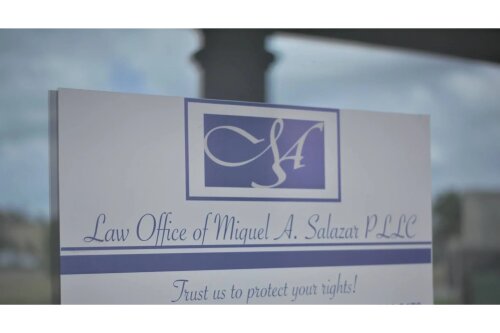Best Toxic Tort Lawyers in Indiana
Share your needs with us, get contacted by law firms.
Free. Takes 2 min.
Or refine your search by selecting a city:
List of the best lawyers in Indiana, United States
About Toxic Tort Law in Indiana, United States
Toxic tort law refers to the area of law that deals with harm caused by exposure to dangerous substances or toxic chemicals. In Indiana, toxic tort cases often arise when individuals are exposed to hazardous materials such as asbestos, lead, pesticides, industrial chemicals, or mold, and suffer negative health effects as a result. These cases can involve workplace exposures, environmental contamination, or products containing toxins. The main goal of toxic tort law is to help those who have been harmed by toxic substances recover compensation for their injuries and losses.
Why You May Need a Lawyer
Toxic tort cases are complex and require extensive scientific, medical, and legal knowledge. You may need a lawyer if:
- You have been diagnosed with a health condition suspected to be caused by toxic exposure
- You believe your workplace or home environment contains hazardous substances
- Your property value has decreased due to contamination
- You have lost a loved one due to a disease linked to toxic chemicals
- You want to take legal action against a company or individual responsible for toxic exposure
- You need to understand your rights and options before interacting with insurance companies or potential defendants
Because toxic tort cases require identifying responsible parties, gathering expert evidence, and navigating statutes of limitations, having an experienced lawyer can be essential to successfully pursuing your claim.
Local Laws Overview
Indiana has specific laws governing toxic tort cases. Key aspects include:
- Statutes of limitations: In Indiana, individuals typically have two years from the date they discover their injury to file a lawsuit for personal injury caused by toxic exposure. Exceptions can apply, especially in cases involving asbestos-related diseases which can have longer latency periods.
- Burdens of proof: Plaintiffs must show a direct link between their injury and the alleged toxic exposure. This often requires expert testimony from medical and scientific professionals familiar with Indiana’s standards.
- Strict liability and negligence: Indiana law allows for claims based on negligence, strict liability, and sometimes breach of warranty if a defective product is involved.
- Comparative fault: Indiana follows a modified comparative fault system. If you are partly at fault for your exposure, your compensation may be reduced proportional to your responsibility. If you are found more than 50 percent at fault, you cannot recover damages.
- Environmental regulations: State and federal laws, including the Indiana Department of Environmental Management (IDEM) rules, may impact your claim, especially in environmental contamination cases.
Frequently Asked Questions
What is a toxic tort case?
A toxic tort case is a legal claim involving injuries or damages resulting from exposure to dangerous chemicals or substances due to someone else's negligence, product defect, or environmental contamination.
What are common substances involved in Indiana toxic tort cases?
Common substances include asbestos, lead paint, pesticides, industrial solvents, mold, benzene, and PCBs. Cases also occur with landfill or groundwater contamination.
How do I know if my illness is related to toxic exposure?
If you suspect your illness could be linked to chemical exposure, consult your healthcare provider and an experienced toxic tort attorney. Medical testing and workplace or environmental evaluations are often necessary.
Can I file a toxic tort lawsuit for workplace exposure?
Yes, Indiana residents may file lawsuits for workplace toxic exposure. However, claims may be subject to workers' compensation laws, which have their own procedures and limitations. An attorney can help you understand your options.
How long do I have to file a toxic tort claim in Indiana?
Generally, you have two years from the date you discovered the injury to file a claim. However, there are exceptions for specific types of exposure and discovery rules, especially with long-latency diseases like mesothelioma.
What compensation can I recover in a toxic tort case?
You may recover compensation for medical bills, lost wages, pain and suffering, loss of consortium, property damage, and sometimes punitive damages if egregious conduct is proven.
Do I need expert witnesses in my case?
Yes, toxic tort cases almost always require testimony from experts in medicine, toxicology, and environmental science to establish causation and damages.
Can I join a class action lawsuit for toxic exposure?
If many individuals are affected by the same exposure, a class action may be appropriate. However, not all cases qualify. An experienced attorney can advise on whether a class action or individual lawsuit is best for you.
What should I do if I suspect environmental contamination near my home?
Document any health issues or property damage, gather evidence like photos or reports, contact local authorities or the Indiana Department of Environmental Management, and consult a lawyer experienced in toxic tort cases.
How much does it cost to hire a toxic tort attorney?
Many attorneys offer free consultations and work on a contingency fee basis, meaning you pay only if you recover compensation. Discuss fees and costs upfront to make informed decisions.
Additional Resources
- Indiana Department of Environmental Management (IDEM): Regulates environmental quality and provides information on hazardous sites and contamination.
- Indiana State Department of Health: Offers resources on environmental health, lead poisoning, and asbestos exposure.
- Indiana Bar Association: Helps locate qualified attorneys with experience in toxic tort law.
- Occupational Safety and Health Administration (OSHA) - Indiana Office: Provides guidance and investigates workplace toxic exposure.
- Legal aid organizations: Assistance may be available for those who cannot afford private counsel.
Next Steps
If you believe you have a toxic tort case in Indiana, start by collecting medical records, photographs, and documentation related to your exposure. Make note of dates, locations, and any suspected substances involved. Contact a qualified Indiana toxic tort attorney for a consultation. A lawyer will assess your situation, explain your rights, and outline possible legal strategies. Act promptly, as strict deadlines may affect your case. Consider reaching out to the appropriate state agencies for guidance or reporting concerns about ongoing toxic exposure. Pursuing legal advice swiftly can help preserve evidence, protect your health, and secure your rights to fair compensation.
Lawzana helps you find the best lawyers and law firms in Indiana through a curated and pre-screened list of qualified legal professionals. Our platform offers rankings and detailed profiles of attorneys and law firms, allowing you to compare based on practice areas, including Toxic Tort, experience, and client feedback.
Each profile includes a description of the firm's areas of practice, client reviews, team members and partners, year of establishment, spoken languages, office locations, contact information, social media presence, and any published articles or resources. Most firms on our platform speak English and are experienced in both local and international legal matters.
Get a quote from top-rated law firms in Indiana, United States — quickly, securely, and without unnecessary hassle.
Disclaimer:
The information provided on this page is for general informational purposes only and does not constitute legal advice. While we strive to ensure the accuracy and relevance of the content, legal information may change over time, and interpretations of the law can vary. You should always consult with a qualified legal professional for advice specific to your situation.
We disclaim all liability for actions taken or not taken based on the content of this page. If you believe any information is incorrect or outdated, please contact us, and we will review and update it where appropriate.
Browse toxic tort law firms by city in Indiana
Refine your search by selecting a city.











